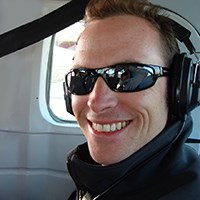Joe Bickerton
Published: 17/10/2019
Route: Non-accredited degree
 Name: Joe Bickerton IEng MRAeS
Name: Joe Bickerton IEng MRAeS
Age: 45
Education and qualifications: Aeronautical Engineering BSc (Hons), Aeronautical Engineering BTEC, Management & Leadership Level 5 Diploma
Which Institution are you a member of? Royal Aeronautical Society (RAeS)
Current job title: Group Leader – Systems Engineering
Company: QinetiQ
Length in current job: 2.5 years (at QinetiQ for five years)
Approximately how many staff are employed by your company? > 1,000
Where are you based? Boscombe Down, Wiltshire
What spurred you to progress towards registration as an Incorporated Engineer (IEng)?
I have always been keen on Continuing Professional Development (CPD) and saw this progression as a benchmark against which to measure myself. Along with my studies I was able to map my development in my roles. Achieving IEng registration was the culmination and, to an extent, the validation of all that I had been working towards.
Describe your experience of how you became an IEng
To start with I did a lot of research on the Royal Aeronautical Society (RAeS) website and was fortunate to be able to engage with a professional registration mentor at work through our corporate sponsored scheme.
My pathway was via a non-accredited degree, significant experience and some other qualifications. It took about nine months for me to finish the application, due to ongoing studies and work commitments. I was fortunate enough to be given the right level of tasks and responsibility to meet the required competences, and my slight change in career direction and the role I took after leaving the Army also helped. I was surprised that the interview was a much friendlier and more pleasant experience than I had expected.
What advice would you give someone considering professional registration as an IEng?
I would say take your time, work hard on making your examples relevant and writing them up well. Get advice from a mentor if you can, choose your study options and courses wisely and, if possible, ensure that they are aligned with the requirements set out in the UK Standard for Professional Engineering Competence (UK-SPEC).
What are your future career goals?
I aim to continue my studies and professional development in my new role and would like to continue progression through the company structure. I intend to work towards further developing my competencies and apply to become a Chartered Engineer (CEng) in the future.




